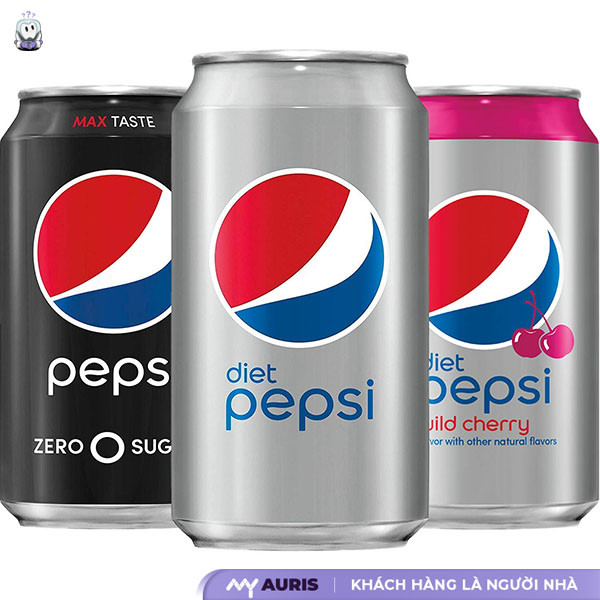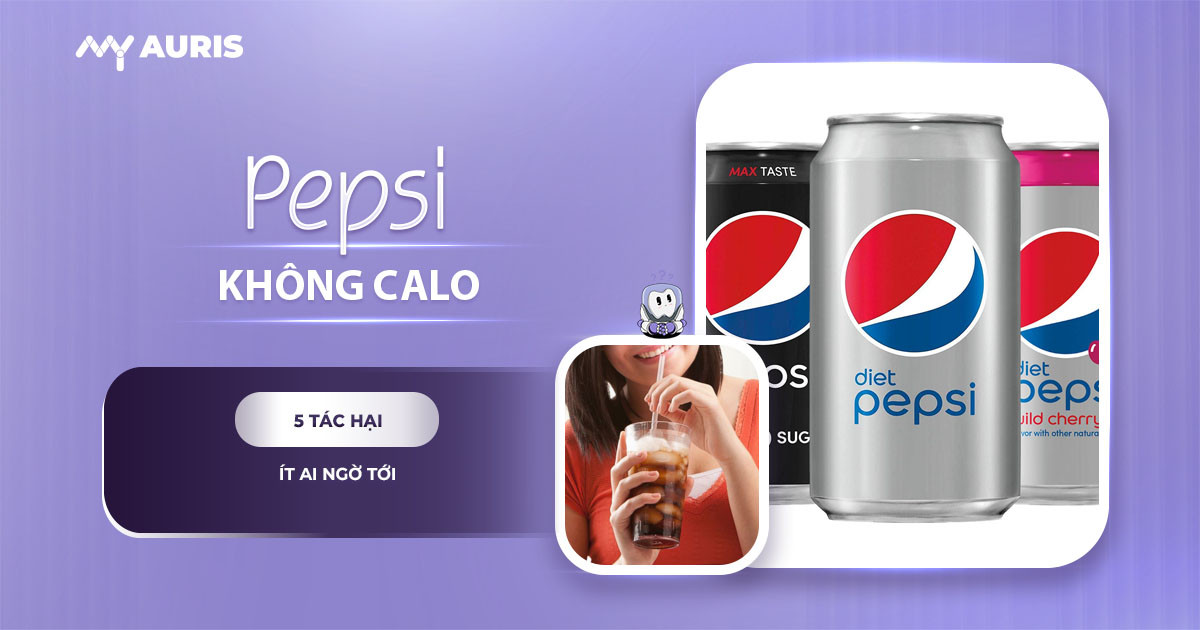Consumers today are concerned about what they put into their bodies. With the need to control weight, maintain stable blood sugar, or simply reduce daily calorie intake, many choose sugar-free soft drinks like Pepsi Zero Sugar to replace traditional Pepsi. But what exactly is inside this calorie-free carbonated beverage? Is it truly sugar-free and calorie-free as advertised?
Nutritional Ingredients and Sweeteners in Pepsi Zero Sugar
Pepsi Zero Sugar is a carbonated soft drink designed specifically for people who want to lose weight, follow a sugar-free diet, or need to control blood sugar levels. Key ingredients include:
- Carbonated water
- Artificial sweeteners such as Aspartame and Acesulfame-K
- Citric acid (to balance flavor)
- Caffeine (may not be present in all versions)
- Flavor enhancers and artificial flavors
- Caramel color
The total calorie content is recorded as 0 kcal, with no fat, sugar, protein, or starchy carbohydrates. Therefore, it is considered a low-energy drink for dieters.

How does Pepsi Zero Sugar differ from regular Pepsi?
The main difference between Pepsi Zero Sugar and regular Pepsi lies in their sugar and calorie content.
While regular Pepsi contains 35g of sugar and approximately 133kcal per can, Pepsi Zero Sugar uses sweeteners to provide a pleasant taste without increasing calorie intake.
Additionally, Pepsi Zero Sugar offers a refreshing sensation with a subtle lemon aroma, combined with the familiar original Pepsi flavor. The refreshing lemon and mild carbonation allow users to fully enjoy the taste without it being too harsh, making it suitable for those who prefer light and low-energy beverages.
Is drinking sugar-free soft drinks good for you?
Sugar-free soft drinks are often advertised as calorie-free and sugar-free, but they use artificial sweeteners for taste. While they may not directly cause weight gain, these substances can pose potential long-term health effects. So, is drinking sugar-free soft drinks truly good for you? Let’s explore the impacts of these beverages on the body through the analyses below.
Impact on Teeth and Bones
Despite being sugar-free, sugar-free soft drinks often contain soda or carbonated water, along with phosphoric acid – a substance that can cause mild tooth erosion and affect tooth enamel. Studies show that regular consumption of carbonated water can be linked to lower bone mineral density, increasing the risk of osteoporosis by 3.7% to 5.4%.
Risk of Diabetes
Although they don’t use conventional sugar, the sugar substitutes in sugar-free soft drinks are not necessarily a safe choice for people with diabetes. Some studies indicate that regular consumption of artificial sweeteners can increase the risk of diabetes by affecting how the body processes glucose.
Risk of Heart Disease
Some experiments have found a link between beverages with artificial sweeteners and the risk of heart disease, especially in women with no prior history of heart disease. Although the mechanism of action has not been clearly identified, this association is concerning and requires further research.
Risk of Kidney Disease
The high phosphorus content in carbonated soft drinks can be a factor leading to kidney damage. According to research, people who drink more than 7 glasses of sugar-free soft drinks per week have twice the risk of kidney disease compared to those who do not.
Changes in Gut Microbiota
A less noticed issue is the impact of artificial sweeteners on gut microbiota. Some studies have shown that these substances can disrupt the balance of gut bacteria, thereby affecting blood sugar control and increasing the risk of metabolic disorders.

Does drinking sugar-free soft drinks help with weight loss?
Many people believe that drinking sugar-free soft drinks will aid in weight loss because they are often advertised as calorie-free or low-calorie. However, the truth is more complex.
These soft drinks often contain artificial sweeteners like aspartame or saccharin. Aspartame, for example, is about 200 times sweeter than natural sugar. While it doesn’t provide direct energy like real sugar, once in the body, aspartame breaks down into methanol and amino acids – synthetic substances that can provide a certain level of calories.
Furthermore, while using these artificial sweeteners can limit sugar intake, it comes with a side effect: an increased craving for food. This can lead to consuming more food, counteracting the initial weight loss goal.
Although sugar-free soft drinks might help reduce sugar intake, due to their impact on appetite and metabolism, they are not truly effective for weight loss. For safe and sustainable weight management, you should prioritize filtered water and a balanced diet, rather than relying on “calorie-free” beverages.
Which groups should or should not drink Pepsi Zero Sugar?
Identifying the right target audience helps consumers make smart choices, protect their health, and achieve personal goals, especially as the trend of consuming sugar-free beverages grows in the Vietnamese soft drink market.
Who should drink Pepsi Zero Sugar
People on a diet or trying to lose weight: Pepsi Zero Sugar is a suitable choice for calorie-controlled diets. By using sweeteners like Aspartame or Saccharin, the product provides a sugar-free sweetness without yielding energy, thereby helping users effectively manage their weight.
People with diabetes or pre-diabetes: As it contains no sugar, Pepsi Zero Sugar has little impact on blood sugar levels, and thus can be included in the limited diet of some diabetic patients. However, it’s advisable to consult a doctor to check for tolerance to artificial sweeteners.
Athletes or people on Keto, Low-carb diets: With zero calories and no carbohydrates, the product is suitable for those pursuing low-energy beverage regimes, weight loss, or needing to completely avoid sugar.
Adults who want to reduce daily sugar intake: Pepsi Zero Sugar provides a refreshing sensation similar to traditional Pepsi without concerns about sugary drinks causing weight gain or tooth decay. This is a smart alternative to traditional sugary soft drinks.

Who should not or needs to limit drinking Pepsi Zero Sugar
Children: Although the product is sugar-free, artificial sweeteners are not generally recommended for frequent use by young children. Additionally, carbonated beverages can affect the digestive system, taste buds, and bone development if consumed excessively.
Pregnant or breastfeeding women: Some studies suggest that pregnant women should limit sweeteners like Aspartame, especially if they have phenylalanine metabolism issues. It’s best to consult a doctor before use.
People with digestive or stomach conditions: Because it’s carbonated, calorie-free soft drinks can still cause bloating, heartburn, or negatively affect the digestive system if consumed on an empty stomach or too frequently.
Individuals sensitive to caffeine: Depending on the version, some lines like Pepsi Max still contain caffeine. People with sleep disorders, high blood pressure, or cardiovascular conditions should carefully check the ingredients before drinking.
We hope the information shared above has helped our readers better understand sugar-free soft drinks and clarified some common misconceptions surrounding these beverages. With updated and clearly presented information, you can consider using sugar-free soft drinks appropriately, in line with your personal health needs.





